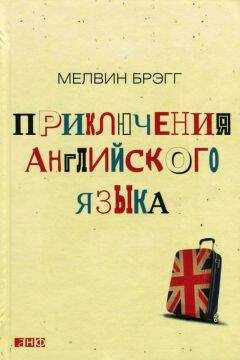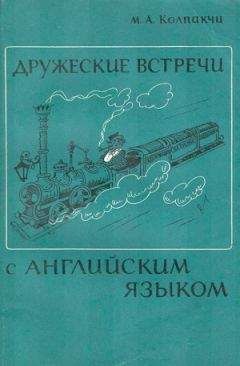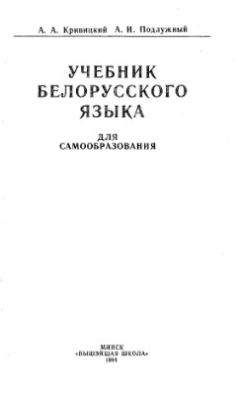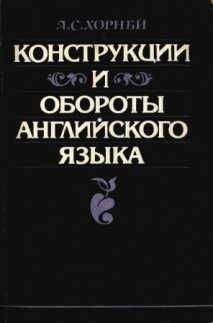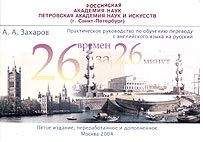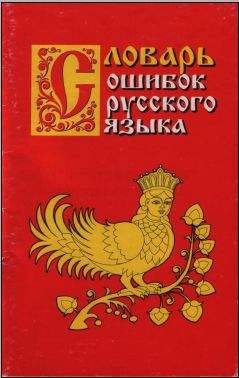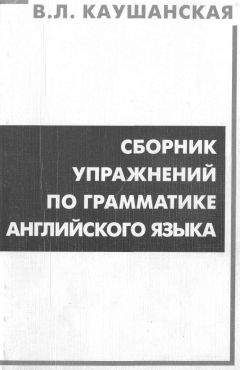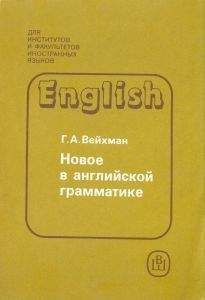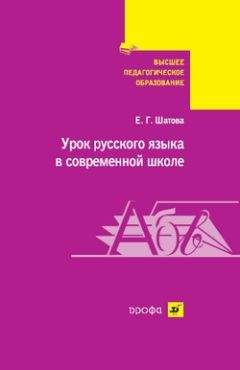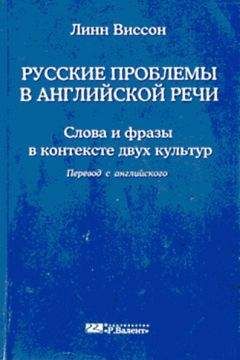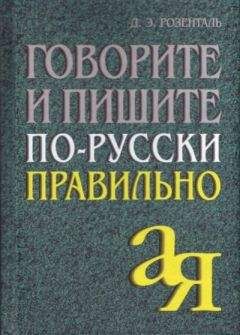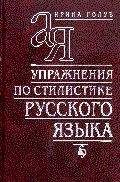Мария Аполлова - Specific English. Грамматические трудности перевода
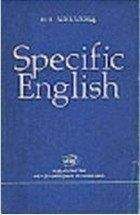
Скачивание начинается... Если скачивание не началось автоматически, пожалуйста нажмите на эту ссылку.
Жалоба
Напишите нам, и мы в срочном порядке примем меры.
Описание книги "Specific English. Грамматические трудности перевода"
Описание и краткое содержание "Specific English. Грамматические трудности перевода" читать бесплатно онлайн.
Пособие знакомит читателя с характерными особенностями английского языка и типичными случаями расхождений с русским языком. В нем суммируются те черты грамматического строя английского языка, которые в силу их специфики представляют трудность для учащихся.
В предлагаемом пособии ставится цель ознакомить учащихся, прошедших первоначальный курс английского языка, с некоторыми характерными системными особенностями этого языка и типичными случаями расхождений с русским языком. Поскольку способ выражения мысли проявляет себя прежде всего в строе языка, в его грамматике, то в пособии вскрываются именно особенности английской грамматики, притом те особенности, которые находили меньшее отражение, а главное — не подвергались достаточной отработке в учебной литературе.
Пособие не претендует на полноту и систематичность описания специфики английской грамматики, но обращает внимание учащихся на отдельные интересные, с точки зрения автора, моменты, которые и придают английской речи ее неповторимое своеобразие.
Кроме того, в пособии рассматриваются такие особенности английского языка, как конверсия, лаконизм английской речи, с одной стороны, и тенденция к известным усложнениям и избыточности — с другой, переходность глаголов и некоторые другие моменты.
Каждый раздел пособия содержит теоретические заметки с иллюстративными примерами в переводе автора. Пособие имеет упражнения, построенные на оригинальном языковом материале и направленные на закрепление практических и переводческих навыков.
Б. Переведите на английский язык, передавая предикативную часть сказуемого беспред ложно.
1. Ей можно дать сколько угодно лет – от 30 до 60. 2. Это пальто как раз такого цвета, который тебе идет. 3. Вы опоздали на полчаса. 4. Комната была высотой в 3 метра. 5. Мои часы спешат на 5 минут. 6. Наш дом находится в десяти минутах ходьбы от автобусной остановки. 7. Он уже 10 лет как умер. 8. И все же он пришел более чем на 10 минут раньше. 9. Его двоюродный брат был почти на два года старше его (his senior). 10. Некоторые здания были длиной почти в милю.
11. Переведите на русский язык следующие сложноподчиненные предложения с эллиптическими придаточными.
1. Her conduct when there had been most unaccountable. 2. It was a dreadful thing that he now proposed, a breach of the law which, if discovered, would bring them into the police court. 3. I see very little point, if any, in such plays in terms of social significance. 4. In preparing for trial the lawyer appointed to represent the accused who is without funds generally has few, if any, of the investigatory resources available for the prosecution or to an accused with means. 5. She wore a fringed chamois skirt and knee-deep cowboy boots, which was a mistake, for you felt that her legs, if fully exposed, would have been the best part. 6. Some plants, though, they blossom just the once, if at all, and nothing more happens to them. 7. Her face revealed little of what, if anything, she felt. 8. A clerk had been dispatched also, to look up Michael’s record, [13] if any. 9. They had made a comfortable, if unexciting, adjustment to life. 10. If subpoenaed, they said, they would state that they had known Lowes only a short time. 11. But his pulse, though thin, was steady.
12. Old Jolyon alluded to him, if at all, as «a hard, thick sort of man; not much refinement about him.» 13. A good talker, when allowed, she would converse for hours together. 14. Emily, though pretty, had nothing, and he himself at that time was making a bare thousand a year.
III. В следующих сложноподчиненных предложениях замените выделенные части эллиптическими придаточными уступительными по модели money or no money (peremptory tone or not).
1. Well, even though he might be a pirate. he’s not going to cut my throat today, if I can help it. 2. Some of them say that whatever the problems might be, pilots are still supposed to use noise abatement procedures. 3. Whether there would be a community meeting or not, there was nothing he could do to eliminate overhead noise for the time being. 4. But if you’re living underneath, knowing why aeroplanes are coming over doesn’t make anyone feel better, whether there is a storm or there isn’t. 5. If the war goes on much longer, I’m going to do something whether my wife likes it or not.
IV. А. Переведите следующие предложения с союзом not that.
1. Not that Frank particularly wanted to remedy matters, for it appeared that his marriage would be a happy one. 2. Not that she did not know what he meant. 3. Not that it was very informative to them even then. 4. Not that Frank had never seen commanding women before this. 5. Not that he was more serious. 6. So this is going to be a proper Christmas for us for once. We have been buying toys and things for George’s stocking – not that he believes in Santa Claus still of course. 7. Not that he ever said anything. 8. It is not that she doesn’t understand things. 9. Not that I’m asking for thanks. 10. It was not that their clothes were particularly cheap, but they were worn badly. 11. Not that the fact fills me with moral indignation. 12. Not that there was anything wrong with Jimmy really. 13. Not that you haven’t done frightfully well.
Б. Переведите на английский язык, используя союз not that.
1. Нельзя сказать, чтобы он жаловался на что-нибудь. 2. Не то, чтобы Бен был особенно известен (popular) в колледже. 3. Нельзя сказать, чтобы она испытывала к нему какие-то недобрые чувства (ill-feeling). 4. Не то, чтобы я ему не верила. 5. Нельзя сказать, чтобы это меня интересовало. Просто я любопытна.
V. Обратите внимание на перевод наречия why в следующих предложениях.
1. His mother must have been crying for some time, before he joined in, without knowing why. 2. Vernon Demerest had asked the question on impulse. Now he wondered why. 3. «Who was Ruysdael?» «Ruysdael? He was a Dutch landscape painter. Why?» 4. There were still several hours of his shift remaining, and he had made a pact with himself to finish his air traffic control duty for tonight. He was not sure why, except that it seemed the right thing to do. 5. Already two irate dog lovers were demanding to know why, when their own pets had been refused admittance. 6. «You’re something of an ideas-man, aren’t you?» «Something of. Why?»
VI. А. Переведите следующие предложения. Обратите особое внимание на перевод выделенных союзов.
1. Leave the frog where it is. 2. The recent increase of water in the reservoirs has created what is described as an «alarming situation». 3. The Douro region is where port-wine conies from. 4. They went heavily, pulling and climbing up the granite shelf and over its upper edge to where there was a green clearing in the forest. 5. And I can’t forbid the house to a man who thinks what my husband thinks. 6. She was happy now where a few weeks before she had been miserable. 7. The mountainside sloped gently where he lay. 8. He had no rights at all where she was concerned. 9. The question of how to obtain the money worried her not a little. 10. It was– well, a sort of habit I hung onto from when I was a little girl. 11. I want an explanation of why Mr Wells was shifted from his original room to 1439. 12. His only moment of risk was when he walked back to his hotel with the paper in his pocket. 13. Also, she feared any diminishment of what she thought of her circle. 14. As if my dear brother-in-law had ever felt any emotions where I was concerned except amazement and contempt. 15. Hugh was hesitating about whether and how to pursue the subject. 16. Miranda was as pale as her mother, but her face had the transparency of marble where Ann’s had the dullness of wax. 17. They could wait, both of them, they could wait for what was left of Fanny’s cash. 18. He was moved by how young she looked.
Б. Переведите на английский язык, обращая особое внимание на перевод выделенных слов.
1. Лучше пойдем туда, где не так много народу (to be crowded). 2. Было очень тихо там, где он лежал. 3. Эта сумма очень мала в сравнении с той, что вы предлагали вначале (originally). 4. Вопрос о том, как устранить недостатки, вызвал много споров. 5. Мы переедем только тогда, когда придет приказ. 6. Я не могу сказать того, чего не знаю. 7. Я не хочу вмешиваться в то, что не считаю своим делом. 8. Это была хорошая иллюстрация того, как филиалы (branch) могут работать вместе.
VII. Переведите на русский язык, обращая особое внимание на перевод слов с различными предлогами.
1. His advocacy of, or opposition to, proposed legislation indicates the party preference. 2. She was even more surprised to find herself invigorated» by, positively enjoying, the atmosphere of relaxed drama which surrounded Emma. 3. Jealousy, envy, contempt, anger, guilt, a kind of pure amazement which was analogous to, though not exactly akin to, admiration strove together in his bosom. 4. My ideas of a Christian do not include laughing at and encouraging a poor mad woman. 5. He has a tremendous faith in and love for people. 6. These popular singers are all folk influenced. But in this production one felt real love for and admiration of the author. 7. Is that decided by the parents, depending on what the child has a bent for and interest in? 8. Like cattle when a dog comes into the field, they stood head to head and shoulder to shoulder, prepared to run upon and trample the invader to death.
VIII. А. Переведите следующие предложения, обращая особое внимание на глаголы или глагольные сочетания, употребленные без дополнения, которое требуется по смыслу.
1. Some said he had made a mistake in Berlin, and that was why his network had been rolled in; no one quite knew. 2. Leamas guessed he was Russian, but he wasn’t sure. 3. You look like you’d swallowed a ram-rod and it isn’t becoming. «I suppose you’ve told the people who’ve called that we’ve a special situation – the storm, a runway (взлетно-посадочная полоса) out of use.» «We explain. But nobody’s interested». 4. «I’m sure that Mr Darrell and I would like to have it as soon as possible.» «I quite understand’ 6. He had also seen the newspaper reporters look up and pay attention. 7. Will did not speak at first and she was grateful. 8. «You know Smith, don’t you?» «Oh, yes, I know the man you mean. Why do you ask?» 9. «If you approve,«he informed Dr Uxbridge, «we’ll transfer your patient to another room on this floor.» 10. But the Board of Airport Commissioners, under political pressure from downtown, refused to approve. 11. I keep asking you to go and you pay no attention. 12. He had never so entirely surrendered to a woman. He did not approve. 13. Have you any spare cigarettes by the way? I seem to be running out. 14. McWatt crinkled his fine, freckled nose apologetically and vowed not to snap the cards any more, but always forgot.
Б. Переведите на английский язык, опуская дополнение в выделенных сочетаниях.
1. Полагаю, что он придет, но не уверена в этом. 2. Я пошлю тебе их рекламы (advertisements), если тебя это интересует. 3. Я пойду к нему не как нищая, а как королева. Он никогда ничего не узнает (to know). 4. Он знает о моем намерении, но не совсем его одобряет. 5. Да, я знаю эту девушку. А почему ты об этом спрашиваешь? 6. «Ох, как вы мне надоели (to bore)!» – воскликнула она. Я и ухом не повел (не обратил никакого внимания).
IX. А. Переведите следующие предложения, обращая особое внимание на перевод выделенных глаголов с предлогами.
1. Не helped her out of the car. 2. But for a woman to venture out into the rough world of men! 3. Peter crossed to the telephone beside the nearer bed. 4. The disgruntled passengers were disembarked and helped through the mud. 5. For an instant her hand went toward the box where she kept her rouge hidden but she decided against it. 6. She was aware dimly of Aloysius Royce returning, of being helped from the bed into a dressing-gown. 7. He crossed the lobby to an unoccupied desk. 8. He helped his customer into his coat. 9. Matthew assisted her out of the drift, from which she emerged with a sucking noise.
Б. Переведите на английский язык, передавая выделенные слова с помощью глагола с предлогом.
1. Он помог старухе перейти улицу. 2. Отец приказал ему идти домой. 3. Помогите мне снять пальто. 4. Помоги дедушке сесть в машину. 5. Он приказал ученику немедленно выйти из класса. 6. Она прошла через всю комнату (to cross) к зеркалу.
X. При переводе следующих предложений обратите внимание на характер передачи на русский язык неличных форм глагола. Определите вид конструкции с неличными формами глагола.
1. I was anxious to get him to continue. 2. For a second, obscurely, he found himself envying Randall. 3. Penn found himself wondering if it wouldn’t be a good plan, if it would not perhaps further his cause, if he were to give Miranda a hard slap one of these days. 4. She was even more surprised to find herself invigorated by, positively enjoying, the atmosphere of relaxed drama which surrounded Emma. 5, I tried to get him to talk, but he kept looking at me in a funny sort of way. 6. A tremor of sheer horror passed over Andrew at the thought of his beautiful career suddenly cut short, ruined. 7. I’m sure Miss Dolly would be pleased to have you join us. 8. She sat wondering however she’d come to marry a bloody fool who got himself sent to jail. 9. I can’t have you faint in the street. 10. I hope it doesn’t upset you my coming like this. 11. It was like having a government inspector in the house. 12. People sometimes accused her of asking husbands more often than wives, but she defended herself by saying that she couldn’t possibly help it because more men were husbands than women were wives. 13. Part of his time in London had doubtless been devoted, unsuccessfully, to getting one of these plays put on. 14. She wasn’t a girl to show much emotion. 15. There are still many fundamental problems to be solved in this area. 16. He took it from his pocket and held it out for us to see. 17. We must know our position to defend it. 18. Am I an idiot to want such a thing? 19. Riley beckoned for me to come with him. 20. Catherine, snoring with abandon, did not hear us go. 21. I don’t know that it was funny, but I laughed to keep him company. 22. I stood watching Riley unconcernedly propel himself to and fro between the banks. 23. Most people don’t believe it when I tell about catching a cat-fish barehanded. 24. I heard Catherine scream: roar, rather. 25. She regretted not having visited there before. 26. He thought he’d failed us in not preventing what had happened to Catherine. 27. Still she behaved as though she hadn’t expected to be kissed good night. 28. He got the impression that he was being edged out of their conversation, as though he were a child who was expected to sit still and not interrupt while his elders talked of things over his head. 29. After all, he had a car that was supposed to have cost three thousand dollars. 30. But it was too early for anyone much to be about. 31. I want you to tell her what I said: go home. 32. She confessed to having invited some boys over to listen to the radio and dance. 33. I’ll thank you to leave us. 34. Only don’t count on me to lift a finger. 35. He couldn’t get Dolly to root for any team. 36. The Judge presented himself at the garden gate and whistled for me to let him in. 37. I want you to behave, Rusty. 38. He was not going to have his son made a bloody snob of. 39. With this there came back to her that sensation of being encompassed and plotted against with which she had first met the news of Emma’s coming. 40. Now I won’t have you saying things I don’t understand. 41. I don’t expect sailors to be saints. 42. Fancy you being there! 43. They showed films and gave medical and legal advice, not only explaining women’s new legal rights, but also working hard to get women to exercise them. 44. He had to ask his way three times; on each occasion he repeated the directions given him, got the man to repeat them, then repeated them a second time.
Подписывайтесь на наши страницы в социальных сетях.
Будьте в курсе последних книжных новинок, комментируйте, обсуждайте. Мы ждём Вас!
Похожие книги на "Specific English. Грамматические трудности перевода"
Книги похожие на "Specific English. Грамматические трудности перевода" читать онлайн или скачать бесплатно полные версии.
Мы рекомендуем Вам зарегистрироваться либо войти на сайт под своим именем.
Отзывы о "Мария Аполлова - Specific English. Грамматические трудности перевода"
Отзывы читателей о книге "Specific English. Грамматические трудности перевода", комментарии и мнения людей о произведении.





